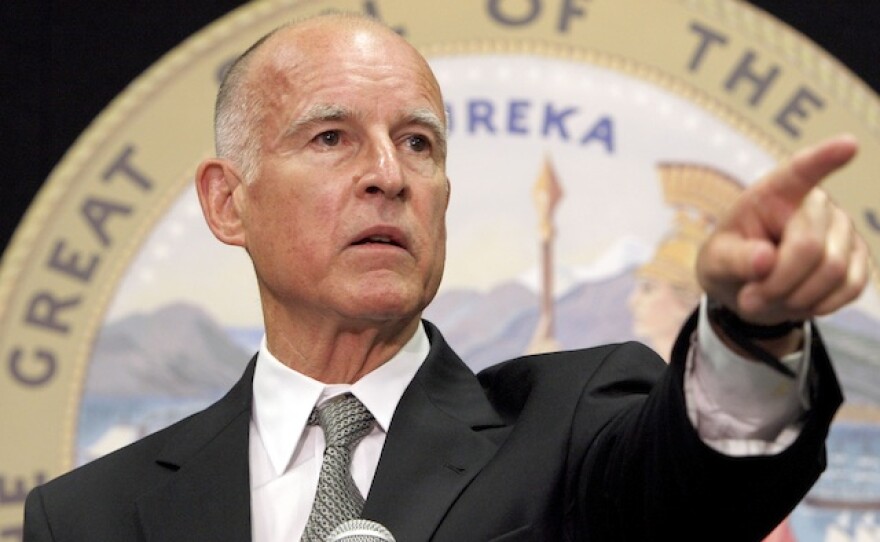UPDATE: 8:20 p.m.
California Gov. Jerry Brown is returning to Sacramento for a record fourth term.
The Democratic incumbent decisively defeated Republican Neel Kashkari on Tuesday after a lopsided campaign in a state dominated by Democrats.
Brown argued during the campaign that he led a comeback by the state after the recession cost California more than a million jobs.
His victory came amid a tough political environment for Democrats nationally, with widespread voter discontent with President Barack Obama.
Original post
Gov. Jerry Brown was on the verge of making history Tuesday as he seeks a record fourth term as California governor after gaining control of the state's once-massive budget deficit and working with a like-minded Legislature to revise school-funding and prison policies.
Voters went to the polls after a muted and sometimes invisible gubernatorial campaign in which the incumbent Democrat never appeared to be threatened by Neel Kashkari, a Republican making his first run for elected office.
A former U.S. treasury official, Kashkari helped lead the federal bank bailout during the recession.
The governor's race in the strongly Democratic state topped a ballot in which battles over congressional and legislative seats, and handful of state and local initiatives, garnered the most attention.
The major parties and their supporters focused most of their money on tight congressional races involving Democratic incumbents in Sacramento, San Diego and Ventura County, as well as a handful of state legislative races that would determine whether Democrats would win supermajorities in the Assembly and Senate.
Voters also will settle statewide initiative battles over medical malpractice damages and health insurance rate increases, while deciding whether to borrow $7.5 billion for water projects amid California's three-year drought.
High-dollar battles over taxing sugary drinks were being waged in San Francisco and Berkeley, while municipalities elsewhere were deciding local measures about fracking and marijuana growing. Oakland Mayor Jean Quan, embattled over her handling of the Occupy protests and police department, was fighting to save her job.
Brown, already California's longest-serving governor, served two terms in the office from January 1975 to January 1983 before it was subjected to term limits. He was elected to the state's highest office again in 2010, his third term. No governor in the state's history has served four terms.
A career politician, he also ran for president three times and has served as state attorney general, secretary of state and mayor of Oakland.
The nation's most populous state with more than 38 million people has long-term problems that include a looming government pension crisis and troubled public school and water-supply systems.
Brown, however, kept his campaign anchored to an optimistic narrative that featured the state's now-balanced budget and job growth since the recession. The Democratic-controlled Legislature approved Brown's plans to send more money to high-need schools and restructure sentencing laws to allow lower-level offenders to go to county jails instead of state lock-ups.
"A lot of people forget the mess that California was in just four years ago," Brown said in the campaign's only debate. "All the jobs we lost in the recession, from the Wall Street meltdown, we've got back."
With a strong lead in the race, he has rarely updated his website. He has spent most of the campaign promoting two ballot proposals that call for borrowing billions of dollars for a variety of water projects and for funneling more money into budget reserves. The rainy day fund would help pay down billions in pension obligations and other debt and provide a larger cushion against future economic slides.
The governor's biggest challenge at the polls might be fighting voter apathy. A statewide primary in June drew a collective yawn from voters. Its 25.2 percent turnout was the lowest for a statewide contest in California history. Turnout on Tuesday is projected to be just 46 percent, which would be the lowest on record for a California general election.
The 41-year-old Kashkari depicted Brown, a one-time Jesuit seminarian, as a vestige of a vanished era. Brown, 76, the nation's oldest sitting governor, began his first term as governor when Gerald Ford was in the White House.
Kashkari also argued the governor was ignoring the plight of troubled schools and protecting the interests of powerful teacher unions that spent millions to elect him. Yet Kashkari was unable to raise enough money to boost his name recognition or get his message across to a wide audience.






